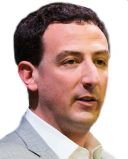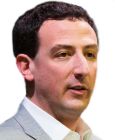
Education
Professor Kevin Laland On What Made Us Who We Are
Communication and learning are drivers of our evolution, not its byproducts.
Posted November 1, 2017
Kevin Laland is a Professor of Behavioral and Evolutionary Biology at the University of St. Andrews. He has published more than 230 scientific articles and 13 books, on topics ranging from animal behavior and evolution to cultural evolution and niche construction. His most recent book, Darwin's Unfinished Symphony: How Culture Made the Human Mind, advances a new theory of human cognitive evolution. Professor Laland argues that culture is not just the end product of our evolutionary process, but is a force that has driven and shaped that process.
In this episode of Mastering Your Reality, Professor Laland and I discussed:
- Humans are exceptional; we’re markedly different from the rest of the natural world. Professor Laland aims to understand this difference in evolutionary terms, studying things like our intelligence, large brains, language, and ability to cooperate.
- Critically, these differentiating attributes did not adapt solely in the context of our external environment, but also in response to our own inventions, practices, and skills.
- Organisms work to regulate their environments. A bird that builds a nest, for example, regulates an aspect of its physical world. This is known as “Niche construction.”
- How you evolve is a function of natural selection. Because niche construction changes the nature of the world acting on you, it directly impacts evolution. It benefits an organism to regulate its world in a way that enhances its survival and reproduction.
- What makes us human? We are not unique in our capability to regulate our environment. (Again, consider the bird’s nest.) We’re just particularly good at it. Why? Culture.
- Our capacity to acquire knowledge and skills from others, invent solutions, and improve those solutions repeatedly—to learn from each other—drive our success as a species.
- All animals engage in some form of innovation and social learning, but not all do it at the same rate. There is a correlation with brain size; animals with bigger brains, like primates, have more culture. They are the animals that use tools the most, with broader diets, longer lives, and higher levels of learning and intelligence.
- So, why haven’t chimps or gorillas succeeded as well as humans—what is the difference? The difference lies in the degree of accuracy transmitting information, and in the duration of cultural traits in a population. A small increase in the accuracy of information transmission corresponds to a big increase in success, as does the duration of a trait in a population. And when you reach a certain threshold of accuracy, you get to a point where culture can become more complex, as with humans.
- As culture becomes more complex, there emerges a need to teach. The best way to teach is to use language. The better the language, the better the transmission of information and the greater the preservation of useful traits.
- We are who we are because of our ability to learn from each other and teach each other—enabled by our ability to communicate with sophisticated languages. Our cultural activities impose selection on our genes and trigger adaptive evolutionary responses.
- We’re descendants of organisms that successfully controlled and regulated their world. We transformed our world through our culture. We still do, whether we’re conscious of it or not.
- What we think and how we interact with the world is less shaped by anything “out there” than it is by the power of our minds to learn and communicate. That power has made us who we are.
Want to learn more?
Click here to read more about Darwin’s Unfinished Symphony: How Culture Made the Human Mind, or click here to learn more about the Laland Lab. You can also watch other episodes of Mastering Your Reality at lidsky.com/blog.

